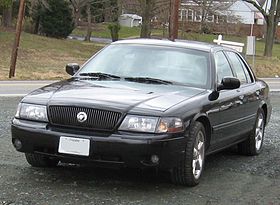Mercury Marauder
| Mercury Marauder | |
|---|---|

2003–2004 Mercury Marauder
|
|
| Overview | |
| Manufacturer | Mercury (Ford) |
| Production | 1963–1965 1969–1970 2003–2004 |
| Body and chassis | |
| Class | Full-size |
| Layout | FR layout |
| First generation | |
|---|---|

1964 Mercury Marauder 2-door hardtop
|
|
| Overview | |
| Production | 1963½–1965 |
| Body and chassis | |
| Body style | 2-door hardtop 4-door hardtop |
| Platform | Full-size Ford |
| Related |
Mercury Monterey Mercury Montclair Mercury Park Lane |
| Powertrain | |
| Engine |
390 cu in (6.4 L) V8 406 cu in (6.7 L) V8 427 cu in (7.0 L) V8 |
| Transmission | 3-speed manual 4-speed manual 3-speed automatic |
| Second generation | |
|---|---|

1969 Mercury Marauder X-100
|
|
| Overview | |
| Production | 1969–1970 |
| Body and chassis | |
| Body style | 2-door hardtop |
| Related | |
| Powertrain | |
| Engine | 390 cu in (6.4 L) FE V8 429 cu in (7.0 L) 385 V8 |
| Transmission | 3-speed FMX/SelectShift automatic 3-speed C6/SelectShift automatic 3-speed manual |
| Dimensions | |
| Wheelbase | 121.0 in (3,073 mm) |
| Length | 219.1 in (5,565 mm) |
| Width | 79.6 in (2,022 mm) |
| Height | 53.5 in (1,359 mm) |
| Curb weight | 4,328 lb (1,963 kg) |
| Third generation | |
|---|---|

2003–2004 Mercury Marauder
|
|
| Overview | |
| Assembly | St. Thomas Assembly Plant, St. Thomas, Canada |
| Body and chassis | |
| Body style | 4-door sedan |
| Platform | Ford Panther platform |
| Related |
Mercury Grand Marquis Ford Crown Victoria Lincoln Town Car |
| Powertrain | |
| Engine | 302 hp 4.6 L Modular DOHC V8 |
| Transmission | 4-speed 4R70W automatic (2003) 4-speed 4R75W automatic (2004) |
| Dimensions | |
| Wheelbase | 114.7 in (2,913 mm). |
| Length | 212.0 in (5,385 mm). |
| Width | 78.2 in (1,986 mm). |
| Height | 56.8 in (1,443 mm). |
Mercury Marauder is a nameplate that was used by three separate full-size cars produced by the Mercury division of Ford Motor Company. Initially marketed as the Mercury equivalent of the Ford Galaxie 500XL from 1963 to 1965, the Marauder wore a distinct roofline. After its replacement by the similar Mercury S-55, the Marauder made its return from 1969 to 1970; it was a fastback version of the Mercury Marquis.
For the 2003 model year, the Mercury Marauder was revived, this time as a high-performance variant of the full-size Grand Marquis. After lower than expected sales, the Marauder was discontinued at the end of the 2004 model year. It is also the last rear-wheel drive sedan introduced by Ford in North America.
The Marauder name made its first appearance in 1958 as Ford introduced a new introduced a new family of V8 engines for its Mercury, Edsel, and Lincoln brands. Exclusive to Mercury was a 383 cubic-inch V8. Dubbed Marauder, it produced 330 hp with an optional 4-barrel carburetor. In that tune, the engine was available in the Montclair and Colony Park. Shared with Lincoln, the 430 V8 was an option, though the Super Marauder option package was exclusive to Mercury. Consisting of three two-barrel carburetors, the Super Marauder V8 was notable for being the first engine advertised with a 400hp output.
For both 1959 and 1960, the 383 and 430 were retuned with lower engine outputs, with the 400hp Super Marauder option lasting only for 1958. For 1960, 383 Marauders became optional in all Mercury vehicles, including the Monterey, Park Lane, and Commuter. As Ford reorganized the Mercury line for the 1961 model year, moving the brand away from Edsel-based models and closer to the Ford brand, the MEL engines were phased out in favor of the smaller Ford FE engines in use in the Ford lineup.
The Mercury Marauder debuted as a mid-year model, sometimes called "1963½" models. The Marauder featured a sloping notchback roof design, in contrast to the reverse-slated "Breezeway" roofline with a retracting rear window that was also used by the (1958–1960) Lincoln Mark III, IV, and V series. The more "fastback" Marauder was available on the Monterey, Montclair, S-55 (1963 only), and Park Lane models. Additional Marauder features included bucket seats, a central console, and other trim items similar to those in the Ford Galaxie 500/XL. This more aerodynamic roofline was developed for campaigning in the NASCAR circuit, and possibly assisting these models to be more competitive in racing.
...
Wikipedia
